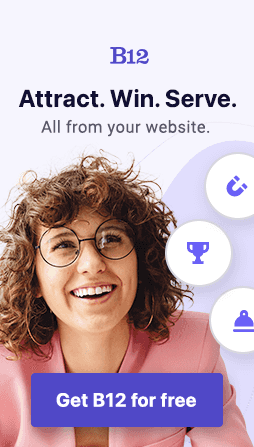Build an AI website in 60 seconds
AI generates your personalized website instantly with built-in scheduling, payments, email marketing, and more.
Start for free
How to change your default email on Google Chrome

Gmail is the most popular email provider in the world, with over one billion active monthly users. So the odds are pretty good that you, your coworkers, friends, and family all have a Gmail account. In this article, we'll walk you through things you can do to take greater advantage of Gmail, customize it to your specific needs, and even offer alternative services that offer more options.
Can you change your default Gmail account email address?
In short, you can't change your default Gmail account address. Your default email address is the one you created when you created your Gmail account. You aren't able to change it because that would, in effect, be similar to creating a completely new Google account.
The closest you can get to changing the default email associated with a Google account is to create a new Gmail with the email address you'd like to use, then copy all of your assets (emails, files, photos) to the new Gmail account. Unfortunately, this is time-consuming and inconvenient.
However, you can change your alternate and contact emails on your Google account, which gives you a few customization options for how you're contacted while still looking professional online.
How to change your Gmail account alternate emails
Start by signing into your Google account. Once signed in, click Personal info in the left-hand pane. Then, under the Contact info pane, click EMAIL. Here you'll see a list of five email options, starting with your Google Account email.
- Google Account email. This email, along with all of the remaining options, is changeable. Your recovery email is for logging into your Google account when you forget your password or get hacked. Think of it as the backup email to your Google account.
- Recovery email. This email, along with all of the remaining options, is changeable. Your recovery email is used to log into your Google account when you forget your password, are hacked, and so on. Think of it as the backup email to your Google account.
- Contact email. This is the email that Google primarily uses to contact you. They'll email you here about changes to your account, security issues, and new features. By default, it's set as the same email address as your Google account.
- Alternate emails. These are alternate emails that you can use to sign in to your Google account. For example, if your Google Account email is user@gmail.com, you can add other_user@email.com as an alternate email address. Then, when you want to sign in, you can use either of these emails (along with your password) to sign in to your Google account.
- About me emails. These emails are basically your display emails. By adding these, you can change which email address other users see associated with your Google account. It won't actually change your default Gmail address, but it does offer a bit of customization.
Changing each of these emails (aside from the first) is fairly easy. Simply click on each one, verify that your identity by entering your password again, click the pencil icon next to the email that's already entered (or add a new email), then enter the new email address you'd like to add to your account.
You should receive an email confirming these changes and may even receive an email asking you to approve the changes. Be sure to approve these changes if requested.
And that's it!
Can you create a Google account without a Gmail email address?
You can! It's actually pretty easy. Just follow all of the same steps you would to create a new Google account, but instead of entering a username to create a new Gmail with, just enter an existing, non-Gmail email address. For example, if your email was user@email.com, you would just use that to create a new Google account.
The advantage of doing this is that you get to access the benefits of a Google account (YouTube, Google Drive, Google Docs, etc.) without needing to create an additional email that you don't plan on using. However, the drawback is that you don't have access to a Gmail inbox, which comes with some pretty handy features.
The top 3 hidden Gmail features
If Gmail is your primary email client, you probably already know about all of its helpful features. It's one of the reasons it's such a popular email app. Below, we've collected three of our favorite Gmail features that you might not know.
1. Email scheduling
Email scheduling is exactly what it sounds like. It allows you to write an email and then, instead of sending it immediately, schedule it to send at a specific time. This allows you to set up your morning emails the night before, email people on important events like birthdays, remind people of meetings, and more.
Using email scheduling is pretty simple. Just log into the Gmail app or website, write the message you want to send, fill in the To field with your intended recipient, click the downward-facing arrow attached to the Send button, and choose the date and time you want to send the message. You can choose from a couple of preset options or even pick a specific date.
2. Send and receive money
Another handy feature of Gmail is the ability to send and receive money, similar to sending money over iMessage with Apple Pay, but with email. It uses the Google Pay integration to make payments over email simple and quick. You can even request money from someone if they owe you.
To do so, just click the "$" when composing an email in Gmail. If you already have payment information tied to your Google account, you'll be able to send money right away. Otherwise, you'll need to set up your Google Pay information first.
3. Confidential Mode
Email is one of the most ubiquitous forms of communication, but also one of the least secure. It's easy for messages to be intercepted and you don't have a lot of control over what your recipients do with your emails. That's where Gmail's Confidential Mode comes in.
Confidential Mode allows you to set expiration dates on your messages, essentially adding a self-destruct to your messages. You can also add SMS passcodes, so people can only view the message with a verification code, and you can control whether or not an email can be downloaded or copied, and if so, how many times.
The best Gmail alternatives
For businesses: Custom email addresses
The best alternative to a Gmail account, especially if you're a business owner, is a custom email address. You've probably seen these before. They're the email addresses businesses use that have their website as the domain. For example, if you were an employee at ABC Company, your email address might look like "name@ABCCompany.com".
Custom email addresses are essential for appearing professional. No one wants to reach out to a customer support team that's using Gmail addresses, as it gives off a lack of professionalism and credibility. Fortunately, getting a custom email address isn't all that difficult.
When you build your website with B12, you have access to our unique email forwarding features. These features make it easy to have a public-facing custom email address without having to split your inbox. Customers and clients can email your custom email address, but you'll still receive all incoming emails to the inbox of your choosing. In other words, you get a professional look while maintaining your personal email address. It's win-win.
For personal use: iCloud
When it comes to choosing a personal email client, few are better than iCloud. It's backed by Apple's strict privacy policies, provides a host of features across all of your Apple devices, like password management, web security, Sign In With Apple, Apple Mail, iCloud Drive, and much more.
The drawback, of course, is that you need an Apple device to create an iCloud account in the first place, so it's only useful if you're already locked into the Apple ecosystem. Additionally, checking your iCloud emails on non-Apple devices is less than convenient. Still, if you're a regular Apple user, having an iCloud email account is a great way to take advantage of even more of Apple's services.
For privacy: ProtonMail
One of the biggest concerns that most internet users have in this day and age is privacy. Digital privacy is something that isn't regulated nearly as strictly as it should be, and there's a huge incentive for companies to abuse their customers' privacy — advertisements.
Luckily, this has sparked a whole host of companies to launch with the sole mission of protecting your privacy on the web. Some of the most popular of these companies are Firefox and DuckDuckGo, but a lesser-known option is ProtonMail.
ProtonMail is a Swiss-based email provider, which is already a benefit to the service's security; Switzerland has some of the most pro-consumer privacy laws in the world. Additionally, ProtonMail is designed with anonymity and strict encryption in mind, so every email you send and receive is as private and secure as possible. It's one of the best options available for keeping your data safe.
For spam: MailDrop
MailDrop is an email service that doesn't involve creating an email account. Instead, it creates several. Essentially, the MailDrop service provides you with a disposable email address whenever you need it. You can create your own or use a randomly generated suggestion.
So what is a disposable email address? It's an email address that you never plan on receiving emails at. You don't care who sends emails to that address. This makes it perfect for avoiding spam and creating accounts with apps and services that you don't want to give your real email out to.
On top of helping you with your privacy, this is also useful for mitigating spam mail. If you ever receive random emails from advertisers, businesses you only interacted with once, or apps you don't use anymore, using MailDrop can help prevent you from ever worrying about these pointless emails again.
For email management: Outlook
Last but not least, there's Microsoft Outlook. Outlook is Microsoft's contribution to email services, and for many, it's the best option available. But that's mostly because it's a lot more than a simple email service.
Like any other email provider, you can create an @outlook.com email address for free. There's nothing too special about an Outlook email, it's just your typical email address. The real magic is in the Outlook email client.
The Outlook email client is an app for Windows and Mac that combines all of your different email addresses into a single, simple app. It's packed with features for managing your inbox, like rule setting, contact organization, scheduling, security, and automation. If your email inbox is always busy, Outlook is a must.
Keeping your emails professional
With so many different options, features, and services available for email, as well as services designed to lock you in, it can be tough to feel in control of your email accounts sometimes.
We hope these tips have helped you regain control over your inbox and provided you with new ways of creating a professional online presence.
To create a professional online presence that includes a custom email domain, try B12's AI-powered platform for free.
Learn how to make a professional first impression
We'll send you tips on how to impress potential clients online and convert them to work with your business.
Draft your site in 60 seconds
Get an AI website made specifically for you that's free to launch.
Start for free ✨No credit card required
Spend less time on your website and more time growing your business
Let B12 set up your professional online presence with everything you need to attract, win, and serve clients.




